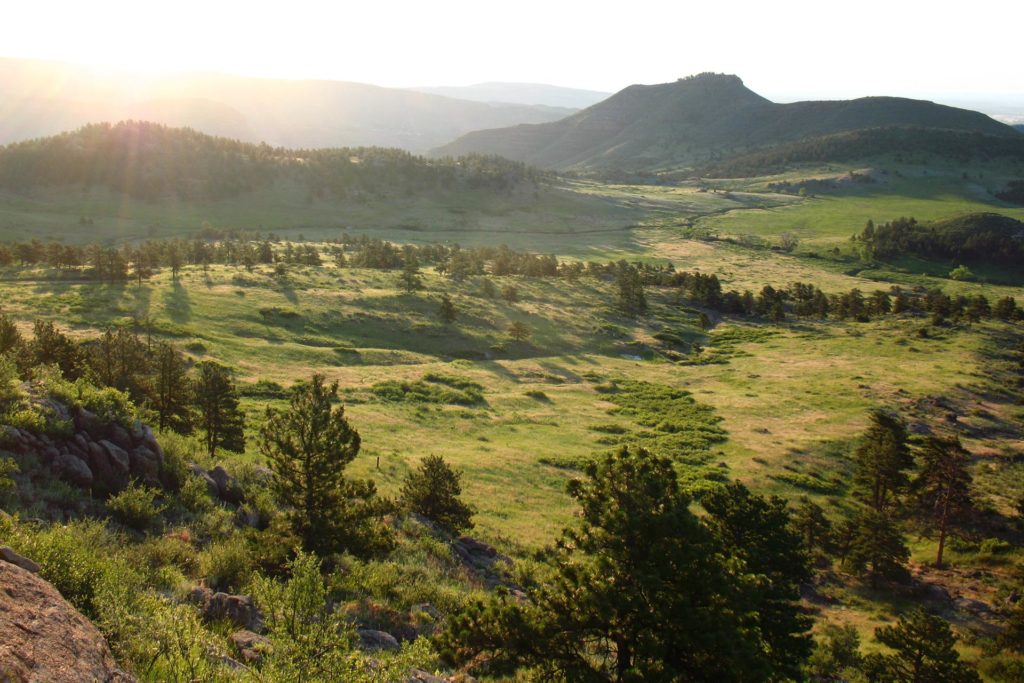Boulder County Ballot Issue 1A: Open Space Sales and Use Tax Extension and Revenue Change
 Wednesday, Oct. 11, 2023
Wednesday, Oct. 11, 2023
Ballot language
WITH NO INCREASE IN ANY COUNTY TAX, SHALL THE COUNTY’S EXISTING 0.05% OPEN SPACE SALES AND USE TAX BE EXTENDED FOR FIFTEEN (15) YEARS FOR THE PURPOSES OF ACQUIRING, IMPROVING, MANAGING, AND MAINTAINING OPEN SPACE LANDS AND OTHER OPEN SPACE PROPERTY INTERESTS; AND SHALL THE REVENUES AND THE EARNINGS ON THE INVESTMENT OF THE PROCEEDS OF SUCH TAX CONSTITUTE A VOTER-APPROVED REVENUE CHANGE; ALL IN ACCORDANCE WITH BOARD OF COUNTY COMMISSIONERS’ RESOLUTION NO. 2023-068?
What it means
Should we keep paying a sales tax that we’re already paying, for a further 15 years, in order to keep buying, maintaining and managing open space lands?
A bit more about the tax
Boulder County voters first implemented a tax to fund an open space in 1993; it has been extended and/or expanded six times since then, most recently in 2016. The current county open space sales and use tax is 0.475%.
A portion of this tax expires in 2024 — that’s the bit we’re talking about, the 0.05%.
All told, open space sales taxes brought in $41.7 million in 2022; 75% of the total $55.9 million Parks & Open Space budget. The 0.05% portion expiring this year contributed roughly $4.4 million of that, or 8% of the total department budget. (Based on calculations done by Boulder Beat; officials declined to answer financial questions. More financial information is provided below.)
What will the extension be used for?
Per the ordinance, these funds could be used for a wide array of open space purposes, including but not limited to
- Buying land, rights-of-way, conservation easements, water and mineral rights.
- Management, maintenance and improvement of open space property and trails. That can be water infrastructure like ditches; restoration and preservation of wetlands and wildlife habitats, and recreation-focused improvements of trails, trailheads, parking lots and restrooms.
This tax extension will primarily be for acquisitions, according to county staff. The department has a specific, perpetual sales tax to fund maintenance; expiring taxes are generally not used for maintenance.
For acquisitions, the county has identified 10,000 acres it would still like to purchase. It will cost an estimated $200 million to buy them all, according to staff.
Properties were not identified in public meetings. Officials declined to provide more information or answer questions.
Why you might want to vote for this
An extension of an existing tax, this measure would not raise taxes. You’re already paying it.
Open space is a longstanding community value. The county currently protects and manages over 115,000 acres and 124 miles of trails across 1,370 properties.
Preserving open space serves more purposes than preservation and recreation: It is crucial for biodiversity and carbon capture efforts, both important in a changing climate. Proper maintenance and management can reduce the risk of wildfire. County open space also supports 62 farmers and ranchers who provide food locally and nationally. Along with land, the county also acquires water and mineral (read: oil and gas) rights, which saves land that could be used for fracking.
Why you might not want to vote for this
This is not a tax increase, but it’s not a decrease either. The county’s overall budget has grown by more than $165 million in the past five years (not adjusted for inflation), as property values (and, therefore, property taxes — the county’s main source of revenue) have risen rapidly.
In that time, county voters have passed two new sales taxes and extended two others.
Officials provided very little information as to what the money from this tax extension will actually be spent on. The only information readily available to the public consists of links to two county ordinances, a three-page memo and (if you cared to watch it) one recording of a public discussion. Multiple county spokespersons declined to provide more detailed information or to answer questions about the tax, past and projected revenue or spending and purchase priorities.
Flexibility in spending is important for governments, but it also leaves less control for residents over how their money is managed. That’s good and bad: County staff is well positioned to make spending decisions, and they may well have withheld the list of prioritized properties for legal or competitive reasons. At the same time, it does give taxpayers less say over taxes and open space.
Voters may want to weigh those considerations in deciding whether or not to extend this tax.
This news doesn’t write itself. Throw us some cash if you’ve got it, so we can keep this community news source free for all.
Who is supporting/opposing?
There is no formal, external opposition or support for this measure, which was brought forward by the Boulder County Board of Commissioners. (That body, of course, is supporting.)
Boulder County Republicans have endorsed a no vote on this measure. The group opposes every tax measure on this year’s ballot.
Boulder County Parks & Open Space funding
2022 budget: $61.47 million
Real estate division spending: $34.4M
2023 budget: $56.2 million
Real estate spending: $21.5M
Open space sales taxes:
– $37.2 million in 2021
– $41.7 million in 2022
Learn more
stories.opengov.com/bouldercountyco/published/PPrqyRNyW
pub-bouldercounty.escribemeetings.com/filestream.ashx?DocumentId=24410
— Shay Castle, @shayshinecastle
Want more stories like this, delivered straight to your inbox?
Elections Boulder County election 2023 elections open space sales tax tax extension taxes
Sign up for a weekly newsletter from Boulder Beat.
Elections Boulder County election 2023 elections open space sales tax tax extension taxes

